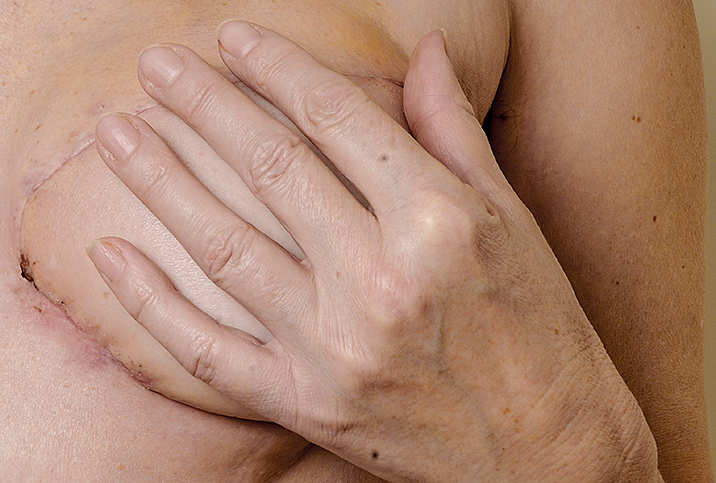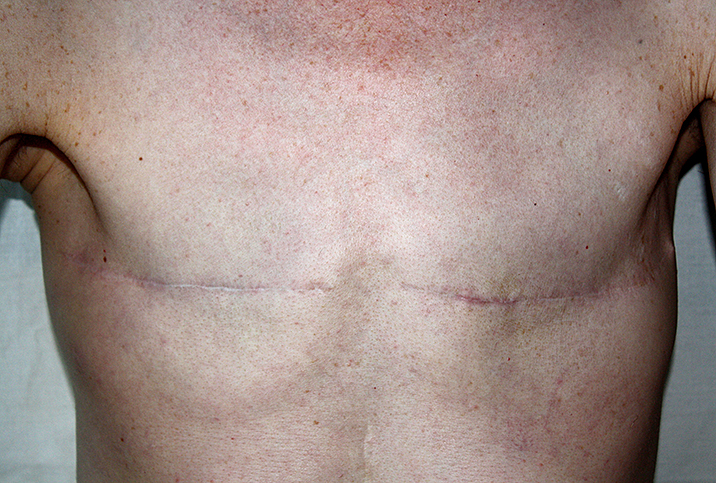How a Mastectomy Changes Your Sex Life

My patience was wearing thin. Leaning back, feigning a moan, I was wondering how he hadn't noticed that the two breasts he was intently groping were unlike most others. Maybe I should've told him—or at least let him know I wasn't really feeling this particular scenario.
What made this night different from any other lackluster romp was that it was the first time I let someone other than trained surgeons handle my breasts since I elected to undergo a preventive double mastectomy six years ago. It was the first of many surgeries during which my breast tissue was scraped from underneath my skin and muscles, severing the nerves that connect my chest to my brain (and, eventually, more intimate parts of my anatomy).
During another surgery, my doctor removed my nipples and later reconstructed them with skin flaps and a bit of creative tattooing. He placed breast implants first under my muscles, then repositioned them above the muscles nearly three years later due to pain and mobility issues.
This all began when I was 27, single, and had just learned that I carried a BRCA1 genetic mutation, which dramatically increases one's risk of cancer of the breasts and ovaries, among others. The options presented to me at the time were surveillance of these areas or surgery to remove them. For my breasts, I chose the latter.
Making the decision to radically alter my body left me obsessing over how this would change it—and how others (namely, men who might see me naked) would feel about it. I wanted to date. Hell, I just wanted to undress in front of a man without first needing to mention my family medical history, the potentiality of cancer, or explain away my scars or why my reconstructed nipples are always erect. But avoiding these conversations left me feeling disappointed instead of normal.
Fretting over a post-mastectomy sex life is not unique. For Kayla Fuller, a 29-year-old marketing professional in Denver, the change was a disappointing and painful one. Breast and nipple play was Fuller's favorite part of sex. But after her initial surgery, she dealt with chronic pain; being touched anywhere on her chest felt like an attack.
"Like, if a guy would bite my nipple—holy shit," she said. "Not only did (surgery) take away this thing I really liked, but it added a layer of pain on top of that."
Fuller has since had corrective surgery that relieved most of her pain, but when she's reached the point of wanting to be intimate with someone, she's still upfront about what her body went through and what works for her.
Most of the time, being upfront about what feels good and why can be positive—or at the very least, neutral. But for Meghan Gallagher, a 33-year-old consultant in Buffalo, New York, honesty on dating apps led to hurtful comments. Gallagher did not have a nipple-sparing mastectomy, nor did she have them reconstructed. Instead, she tattooed one side of her chest with a tidal wave in shades of blue to mark this new beginning. She keeps a photo of herself in a bathing suit on her dating profile that shows off the ink.
"When someone brings it up, I address why right then," she said. "For me, it doesn't feel like there's a casual hookup anymore."
But this type of vetting doesn't always weed out insensitivity. Upon seeing Gallagher's chest, one "casual hookup" asked if she was trans—assuming her scars and missing nipples were an indication she wasn't a "real" woman. The comments cut deep, said Gallagher, who was still making peace with her decision to voluntarily give up a part of her body that society says makes someone a woman.
Any part of the body is a potentially erogenous zone.
Mary Jane Minkin, an OB-GYN and co-director of the Sexuality, Intimacy and Menopause for Cancer Survivors Program at Yale University's Smilow Cancer Center, lamented that while breast reconstruction has come a long way aesthetically, doctors still haven't perfected a way for patients to retain or regain sensation in their chests. However, this isn't a reason to panic.
"The thing to remember is that any part of the body is a potentially erogenous zone," Minkin said.
Communication is key between partners, she said. Sharing which areas of the body feel good when touched and which do not is a conversation everyone should have with their partners, not just someone who's undergone surgery.
Not all communication needs to be verbal, either. After Cheryl, 33, got a mastectomy, she used physical cues with her longtime partner, guiding her away from her breasts.
"She knows it's not always my fav(orite) and makes me more aware and in my head," Cheryl explained. The pair already discussed the impact of Cheryl's mastectomy on their sex life, but the occasional (and subtle) reminder can improve the moment. "Sometimes it doesn't bother me and sometimes it does, and I'll either move her hand or our positions," Cheryl said. "She knows what that means."
It sounds almost too quaint that the conversation that plagued me wasn't what would derail my sex life. My scars are my reminder to always say what I need, in any situation. Intimacy is an exercise in communication; not of a person's complete medical history, but of their experiences and desires.


















